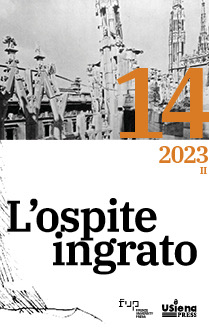Published 2023-12-22
Keywords
- rubble,
- third landscapes,
- places of trauma,
- Italian poetry of the twentieth and twenty-first centuries
How to Cite
Copyright (c) 2023 Andrea Afribo

This work is licensed under a Creative Commons Attribution 4.0 International License.
Abstract
Rubble, debris, wreckage belong to the “intimate fabric” and “the very instinct of poetry,” wrote Zanzotto in his Montalian essays. This essay investigates and reflects on such a motivic constellation, nearly a new topos, in Italian poetry of the second twentieth century and the extreme contemporary. In the first part, starting from some critical pages by Sereni and Zanzotto himself, some meanings and functions of rubble are fixed in advance, including, trivially and in extreme synthesis, between a sense of the end and the destroyed and generative signs of new value grammars, between “scatology” and “eschatology” to quote Zanzotto again. The central part of the essay identifies a number of categories within which to place and distinguish the repertorized material. These include the category of brownfields or ‘third landscapes’; that of landfills; or that of places traumatized by catastrophic natural events such as earthquakes or volcanic eruptions. The essay’s conclusions return to the meaning and senses of rubble, waste loci, ruins and so on. The poets cited are Maurizio Cucchi, Fabio Pusterla, Antonella Anedda, Franco Buffoni, Italo Testa, Giuliano Mesa, Vincenzo Frungillo, Cosimo Ortesta, Flavio Santi, Sara Ventroni, Giovanna Frene, Francesca Matteoni, Giuliano Tabacco, Andrea Raos, and Maria Grazia Calandrone.

